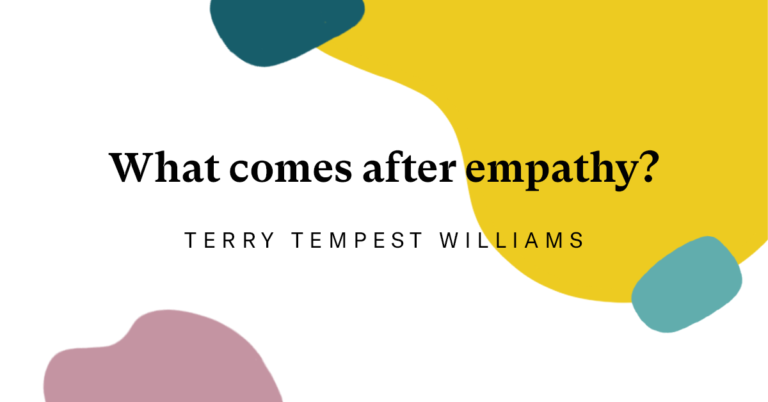Terry Tempest Williams
Empathy Rooted in Action
Naturalist Terry Tempest Williams brings meaning and direction to the grief around ecological loss and climate change. She’s a self-described “citizen writer” rooted in the American West, and she draws connections between fierce love and hard work — both in the natural world and the human world. “It all comes down to relationships, to place, to paying attention, to staying, to listening, to learning — of a heightened curiosity with other,” Williams says.

© All Rights Reserved.
Guest

Terry Tempest Williams is a writer-in-residence at Harvard Divinity School. Her books include When Women Were Birds: Fifty-four Variations on Voice, Refuge: An Unnatural History of Family and Place, and most recently, The Hour of Land: A Personal Topography of America's National Parks.
Transcript
[music: “Sun Will Set” by Zoë Keating]
Krista Tippett, host: I’ve had hundreds of big conversations, and my conversation partners share wisdom I carry with me wherever I go. Terry Tempest Williams is a beloved naturalist raised Mormon in Utah. She calls herself a “citizen writer” rooted in the American West. I love the connections she draws — in the natural world but also the human world — between fierce love and hard work.
This is Becoming Wise. I’m Krista Tippett.
Ms. Tippett: You have been part of what I would say has been a growing movement, awareness about the natural world. You’ve been steeped in it, I think, from childhood. I just wonder if you think about — if you’d reflect on how that whole sphere of waking up to the natural world and our place in it, which has many dimensions, what that experience is teaching us that might be useful in this political moment? This cultural moment?
Terry Tempest Williams: I think about Great Salt Lake growing up as a child. You went to it once. You ran in, you screamed, and you ran out. And you drove home pickled because — kids have scratches on their legs, and, you know, it was a horrible experience. Today, in 50 years in my lifetime, Great Salt Lake is being celebrated, and every year in May we have a Great Salt Lake bird festival. That would’ve been unthinkable then. And the connectivity that’s being made of the birds in Great Salt Lake are coming down from the Arctic or going down to Mexico, even into the Gulf of Mexico. So when we see a tragedy like the oil spill in the Gulf, that doesn’t just affect people who live in Louisiana or Alabama or Mississippi.
Ms. Tippett: People know their connection to it.
Ms. Williams: Yeah. I heard one of my nieces say, “Those are our pelicans too.” So there’s that connectedness that is local, that extends beyond our home ground.
I think there’s something that we are losing that I really grieve and I worry about, and that’s where I think it does come back to education. I think we’re losing an ecological literacy, a biological literacy, that we no longer know the names of things: great blue heron, long-billed curlew, cinnamon teal, blue-winged teal, green-winged teal. If we don’t know who we live among, then when they vanish, there’s no one to mourn that loss.
I think it’s very important that we establish a phenology so that we know that when the coyotes are howling with their young in August, it’s also when the young meadowlarks are hatching. The interconnectivity, again, we go back to this same thing of how it all comes down to relationships, to place, to paying attention, to staying, to listening, to learning — of a heightened curiosity with other. We can go the route of love of other, or we can go the route of fear. And I think too often we go the route of fear, and we shut down. Because if we open to love, then we’re going to get hurt, and we’re going to get angry.
Ms. Tippett: That’s a really important point to make, that love is not something squishy and romantic.
Ms. Williams: It’s fierce. It is absolutely fierce. But the other side of love is that empathy. I always wondered why when someone died in my father’s neighborhood in his community, he always went the next day to their house. He didn’t call; he just showed up. And I thought, what an amazing thing, because I think so often when we hear someone’s died or we want to give them privacy or we don’t want to bother them or impose. And it was only last night I heard him say, “Yes, today is the anniversary of my wife’s passing, but tomorrow is the hard day because when I woke up I was alone, and there was no one there.” That’s love. And the other side of that love and loss is the empathy rooted in action, where my father is there on that next day with his friends. That’s what I’m talking about. So I think it’s about making commitments to do the real work, the hard work, because ultimately that’s where I have found the most joy.
[music: “Sun Will Set” by Zoë Keating]
Ms. Tippett: Terry Tempest Williams’ newest book is The Hour of Land: A Personal Topography of America’s National Parks.
Becoming Wise is produced by Marie Sambilay, Lily Percy, and Chris Heagle at On Being Studios, which is located on Dakota Land. And our theme music is provided and composed by Zoë Keating.







Reflections